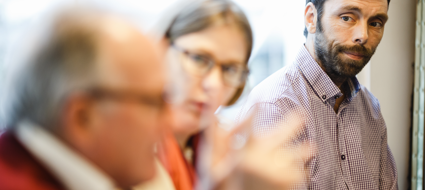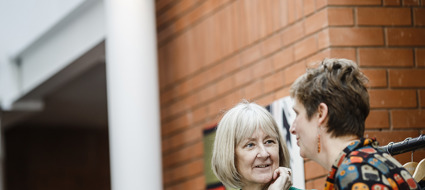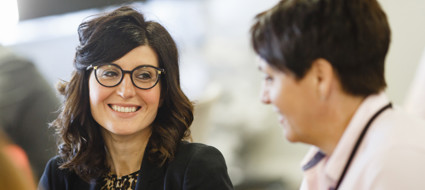Virtual supervision: A supervisor's perspective
Published:
This Podcast explores supervision in the context of COVID-19 and the experience of virtual supervision.
Sally Nieman, Professional Social Work Educator and Research in Practice associate, speaks to Shabnam Ahmed, trainer and practice educator from the London Borough of Camden. They explore the benefits and challenges associated with virtual supervision from the perspective of a supervisor.
[Introduction]
This is a Research in Practice podcast, supporting evidence-informed practice with children in families, young people and adults.
Sally: Hello, and welcome to this podcast where we're going to be talking about what supervision is like during COVID-19 and get the perspective of someone who is supervising social care practitioners in adult social care. So, I'm Sally Nieman, I'm a professional social care educator in Camden and I'm a Research in Practice associate. And I'm really pleased to be here with Shabnam Ahmed, who's a team manager, managing a large team of staff and who has always had an amazing passion for and focus on supervision. So, hello Shabnam.
Shabnam: Hello, Sally. Pleased to be here today.
[The changing context where supervision takes place]
Sally: So, we're going to talk about, as I say, some of the challenges around supervision in the current situation and I want to get a sense of what you think might be working well. My sense is that supervision seems much more important than ever during this COVID-19 situation. So, if we maybe start of by saying, you know, does supervision feel different at the moment? Has anything changed and what might be some of the challenges?
Shabnam: Yes, Sally. I think an answer to your question, would be is supervision different? Is both no and yes, and I say no, Sally, I guess because I guess I'm still providing regular and consistent supervision towards all my staff, I'm still recording it in the same way that I usually do. I'm also, you'll be pleased to hear, still receiving regular and consistent supervision myself, so in that regard, I don't really feel things have changed. However, having said that, I think there are definitely some changes to acknowledge within supervision and I think currently, with the COVID-19 situation, the first and foremost is that you're not sat in the same space as supervising.
Sally: We're not as well.
Shabnam: Absolutely, yes, so supervision is virtual, it's through a screen. So, that's definitely something that's different. I think another difference I've noticed is that generally, I usually broadly structure my supervision by using the 4x4x4 model, by Morrison. So, you'll be aware that there are four functions of supervision, as part of that model, you've got the management, the development, the support and the mediation. And also, it's, sort of, underpinned through a reflective lens. Now, I usually, sort of, whether it's raining or not, click my umbrella open and have a large, overarching umbrella over that framework which saves compassion and well-being. And for me, currently, in supervision, it feels that there really needs to be an enhanced emphasis on the support function of the four that I was talking about. And there has been a real need to enhance compassion in supervision, that's really been my experience over the last, you know, four to six weeks. And I say this, Sally, because these are really significantly different and difficult times, so like you said, what are some of the challenges alongside the changes? So, some of the challenges, Sally, that are coming up are the topics for discussion in supervision are very different to those that I usually discuss in supervision. Or that usual supervisors bring forward in supervision. So, for example, people are, as you know, homeschooling so children are at home, they're needing that attention. And from time to time, the guidance, so parents are having to juggle that with their full-time job. And finding that challenging and requesting adjustments around that, so I think that's, you know, one of the challenges and differences that have come up. Some staff, sadly, obviously, are experiencing loss and bereavement and this feels like unparalleled grief as it's sudden, and it's unexpected. And furthermore, it brings with it a lot of anxiety about one's own mortality. So, feelings are coming up a lot in supervision, Sally. Feelings of fear, sadness, you know, grief, guilt, and that's quite different as a manager, as a supervisor. We talk about feelings, we acknowledge feelings but the feelings that are coming up at the moment seem quite different. And so, what I'm finding really useful there as a tip is using some tools, you know, like some of the tools in RiPfA (Research in Practice for Adults). You've got the, kind of, Blob Tree. I use a tool that psychologists use, it's a feelings wheel and I'm finding that very helpful, and I think supervisees are finding it helpful as well. I mean, there are other challenges like staff having loved ones in hospitals are waiting that one call a day to get an update but they want to continue to work and keep busy, and not let the service down. Another thing, Sally, that's coming up is people's sleep, you know, mine's included. Sleep's been interrupted by feelings of fear and anxiety, I mean, these are issues that don't normally come up in supervision or very occasionally come up. Sally, there are also those practical issues around space and confidentiality, not everyone has separate rooms to work from and if you're working from home and your partners working from home, and the children are home, it can be quite difficult to navigate all of those things. And also, more recently, now that we've been working home for quite a while now, health and safety issues are starting to come up, like, people are working without their special desks and special chairs. So, back pain, neck pain, that seems to be a key theme that's coming up. Another, sort of, challenge and a difference I've noticed is that supervision is taking longer and rightly so, as usually as a manager, when you're in the office, people are approaching you, the staff are approaching you. They're consistently, kind of, discussing their work with you, teasing out their analyses and decisions. So, when you get to supervision, it doesn't feel new, the situation that they're working with feels very familiar. But this is not really happening because we're all working from home, we're not sat in the same office space, they're not sat next to colleagues to tease things out. So, naturally some of the discussions I'm finding in supervision that are very detailed and are taking longer.
Sally: That's an interesting perspective. I hadn't thought about that one, that sense of not being able to bounce things on so having to take longer for the supervision, that's a really interesting perspective.
Shabnam: Yes, it's that whole thing about being a part of a team, isn't it? Being within the same space and being able to just talk to each other. I think we've lost some of that and I think the staff are reluctant to phone me, because as a manager, I do attend a lot of meetings but what I found with this current situation, is I'm in more meetings than I was ever in before. So my diary looks so full so I know that staff won't necessarily ring me in the same way that they would have seen me at a desk and approached me. So, I think that's made a difference and I think another prominent difference is people are not doing home visits. So, my borough took the decision that they will only do necessary and, sort of, urgent visits that are really required. So, usually, I really value and learn from staff experiences of their home visits and that lived experience of the person they're working with. But the thing is that's not happening at the moment, so it, kind of, feels a little bit different. So, kind of, going back to your question of supervision feels different, yes, I think there are definitely some differences but I think that's to be expected, I think it's okay. And what continues, Sally, to really impress me is how steadfast staff have remained and the ability they've shown to adapt and just, kind of, roll with things, just go with things. So, those are, kind of, some of my perspectives on the challenges and the differences.
Sally: That's really interesting and for me, some of the things that you bought out there were very much about how, you know, there's a really strong element of the personal which comes through as well as the profession and supervision. Which is always there, but seems to be, sort of, amplified at the moment, the personal things that people are experiencing are having an impact on the way that they carry out their roles, and their professionalism and supervision has a really impotent role to support that. And, I mean, I got a sense from when you were talking that there were a lot of challenges that you're thinking about how to manage them and support your staff. I wonder if you could talk a little bit about what you think is working well at the moment?
[The elements of virtual supervision that are working well]
Shabnam: Yes, absolutely. I think there are many things that are working well and I think a simple thing, Sally, is I wasn't doing this before but just putting the video on when you're having supervision. We know that non-verbal communication speaks volumes, it really supports the congruency between the tone and the word. And I also think in this, kind of, situation, we need to make supervision as relational as possible so I think having the video really allows that. However, I say that because not everyone wants to have the video on, so I think it is about seeing what your supervisees' views around that. Most people have been okay with that and actually, really enjoyed it and welcomed it. But some people, you know, it's not for them, they don't really want their manager to see their bedroom or living room, or kitchen where they're working from. So, I think you have to be respectful around that.
Sally: That's going back a bit to what you were saying about what's the practical considerations of space and confidentiality, that people might not feel that, as I say, they want you to see where they're working or their, you know, where there are children running around in the background.
Shabnam: Exactly. Although, that makes it all very human, it really depends on the supervisees' take on it. I think another thing that is working very well is acknowledging the, kind of, importance and relevance of supervision being person-centred. And I feel it should always be that but again, like I mentioned before, due to some of the challenges and some that I shared earlier, I think we as managers really need to consider this more fully. So, showing flexibility as a manager is really important, what I'm finding is some staff need more frequent supervision than the usual, monthly, you know, four-weekly supervision. Some people might prefer two shorter meetings instead of one long one due to having the children at home, some may need extra time in supervision so as a manager being prepared for that always. I think that helps, it's not having a really tight diary when you're booking in supervision, knowing that it might run over and not leaving the staff, 'You know, I'm really sorry but I've actually go to go to another meeting.' So, I think it's good to keep that gap there in supervision, particular because staff aren't able to approach you as often as they were when we were in the office. I think being prepared has really helped supervision to function well in these circumstances. So, for example, if staff need certain information around policy or a senior management decision like, you know, 'I need to adjust my hours or there's a bereavement, I need special leave.' So, as a manager, I think it's really important to sort clarity for them, so you can bring that to supervision. I think that also works two ways, if you need your supervisee to have prepared a case summary or a mental capacity assessment, then to give them advance notice so supervision can be used, that time can be used appropriately and effectively. So, I think preparation is really, really important. I think another interesting thing that I'm observing to be working well.
Although I said earlier, Sally, is about the support function of the supervision being very strong, what I've noticed is that the current situation has brought with it new learning for people, including myself. So, although face to face training is postponed, there are some really, really reflective discussions taking place in supervision and staff, including myself, are all developing and growing as we adapt and we work in different ways. People are being really creative, thinking laterally, finding really, sort of, creative solutions around the work. So, I'm observing a lot of development and I think this development and ideas need to be captured in supervision, and that's what we're doing so that we can contribute when we go back to the new normal, whatever that might be because I think the situation is teaching us many, many lessons, Sally. So, there is that element I think of support but also development that's taking place throughout supervision at the moment, even though face to face training is paused.
Sally: Yes, I think that's a really interesting observation that actually, you know, through this there's actually a lot of positive things that are coming out, and that people are learning and thinking more creatively.
Shabnam: Definitely.
Sally: Just focusing on the problem so it, sort of, really chimes with that whole concept of strength-based working that a lot of local authorities are implementing at the moment.
Shabnam: Definitely, Sally, yes, I agree. Yes.
Sally: That's great, and I suppose, I mean, you've talked a bit about this already but what do you think is most important for you about supervision at the moment?
Shabnam: As you've probably gathered, Sally, I've always prioritised health and well-being in supervision, and this remains important to me, you know, even more so during this pandemic. As I, kind of, always say and I'll refer to the quote, 'An unlit lamp cannot provide any light.' Or, like you said to me several times, you know, 'You need to secure your oxygen mask first before you try to reach out to others.' So I, as a manager, feel that I need to ensure that my staff are appropriately supported and resourced as in their wellness lies the wellness of the people they're supporting. And ultimately, Sally, that's what we're in the work for, isn't it? That's the reason why we came into social care, to make a difference, and it's so important at this time, more than ever. I think it's very interesting that we have the lowest sickness rate, at the moment, Sally, as compared to previous times.
Sally: That is interesting isn’t it.
Shabnam: You know, and this shows to me people's motivation to want to work, even if they are feeling slightly under the weather or don't have that special desk or chair they usually have in the office. So, as a manager, I really want to acknowledge that attitude and resilience, and adequately support that. And, you know, if their well-being is being impacted on, then I need to also address that and be transparent about what the organisation can offer. And I think another thing during this pandemic that remains really, really important to me is that our organisational values and culture remain strong, and doesn't dissipate in any way. Because again, I think that remote working and us not being together, and not knowing really in the usual way that we exist in the office, it's very different at the moment. So, I think supervision is fundamental and key, a core function of maintaining that, sort of, organisational harmony and culture, and creating both collective resilience and partnership. So, it's, you know, supervision is more important than any other time I think at the moment.
And also, as a manager, I think being well informed, although we are trying as much as possible to live here to, you know, business as usual. We know that we're having to make adjustments, we know that we're working differently. So, I think if you're well-read and up to date with the policy, that really enables me to pass that to my staff so that they're adequately resourced and informed. So, these are the kinds of things that I think are really, really important for me currently in supervision because as I say, when we come back to the new normal, we don't want it to be, like, a shock to people so you want to remain consistent and keep people updated, and keep that organisational culture going extremely strong.
Sally: And I think that's really interesting, isn't it? That observation that actually, sickness rates are lower at the moment than what you would expect given what's going on for people, it, sort of, demonstrates that culture of being flexible. And acknowledging that the personal has an impact on the professional is actually working in staff, helping staff to feel more resilient and supported, and that there's a focus on their well-being. So, as you say, that's a lesson to really, sort of, think about when we go back to the new normal.
Shabnam: Yes, definitely, Sally, yes.
[Personal experiences of supervision during lockdown]
Sally: And I suppose in all of this, you talked an awful lot about, you know, how you're supporting your staff and you did say at the beginning that unfortunately, you're having your own supervision at the moment. But I guess I wondered, you know, how are you looking after yourself at the moment?
Shabnam: That's an interesting question. No, I am looking after myself, I think initially, Sally, when we went into, kind of, lockdown, I went into autopilot. And I was working very long hours, I was not taking any breaks and, you know, the adrenaline just kicked in and I felt that there was a lot to do. But then, I realised as a manager, I'm also modelling all the time and this is not a behaviour I want to model. Also, I realised we were in this for the long haul so I needed to manage myself better, to extend my own, kind of, fuel really. So, I really, kind of, took the advice that I usually give so I started taking my breaks, had a lunch break, I started the hours that I'm supposed to work, working reasonable hours. Interestingly, I also had annual leave planned and although, like all of us, our flights had been cancelled, our holidays had been cancelled. I still took my leave and I'm really glad that I took that. And I'm encouraging staff to take leave as well because I think it's so important to just, you know, refuel and feel rejuvenated again so I took leave. Going for, like, a daily walk and exercise so taking advantage of the government's rule of having your daily walk. I think keeping hydrated is really important, all the telephone conversations, everything's over the phone now, meetings, you know, supervision. So, keep drinking that water. I also think reaching out to, like, some of my other colleagues, management colleagues, has been really helpful and just having that, if I need that space, just ringing one of them and having a chat. And just asking how they're finding things or how they might be doing things. And as I mentioned, having supervision myself, I think that's been really, really important for me. Like I mentioned before, Sally, you know, I myself, in the beginning, was having difficulty sleeping and through supervision, a colleague, a staff member shared with me a really good app and that really helped me.
I started using an app to help me sleep so that was really helpful, so we can all, you know, help each other in this and then, limiting news and social media. I made a conscious decision to just, kind of, watch the news once a day and not open all the links and the WhatsApp messages people are sending me. And making a conscious decision to ignore those because, you know, it's just all quite negative, isn't it? So, those are some of the things I'm doing to look after myself and I think they're really, really helping. And I think, you know, if people aren't doing that then they really need to think about seeing what works for them. And getting the help and support that they need.
Sally: And I think you're right, that modelling is so important because, you know, it's all very well you advising staff to do those things if you're not doing them yourself. So, that's really positive that you're able to do that as well. And so, just before we, sort of, finish up, I just wondered if you had any last comments or any last hints and tips that you would like to leave us with?
Shabnam: Yes, sure, Sally. So, I often think that if you split the word supervision into, like, two separate words, you get super and you get vision, don't you? So, for me, super, kind of, when I interpret that, I interpret that as something special and vision for me is one's outlook on their life or their work, in the mind's eye. So, I think when you bring that together to, you know, supervision, to me it's that special time to explore, to discuss the things that are relevant and influencing the work that we do. It's that sacred time between you and your manager to pause, to reflect, to breathe, and I think to feel held and contained. So, I think supervision is something we always need in our profession and what we need at the current time is, I started off by saying is to really enhance that compassionate element of supervision by closely listening but also acting. And I guess the last point I wanted to make is my hope and aspiration at the end of every supervision is that my staff have experienced fulfilment and by that, I mean, like a flow of energy and a fulfilment by that energy as no one can pour from an empty cup. So, for me, supervision serves as a replenisher for us all. So, I would just say keep it going, you know, keep it regular, keep it consistent and person-centred, and above all, as managers, ensure that you receive that too. I think those would, kind of, be my final words for this podcast.
Sally: And I think particularly that, sort of, idea of the special outlook is a really peaceful way of thinking about it and a really nice way I think to end our conversation. So, thanks ever so much, Shabnam, for, sort of, sharing your thoughts and perspectives today.
Shabnam: You're most welcome.
Sally: And thank you.
[Outro]
Thanks for listening to this Research in Practice podcast. We hope you’ve enjoyed it. Why not share with your colleagues and let us know your thoughts on Twitter? Tweet us @researchIP.
Professional Standards
PQS:KSS - Supervision, critical analysis and reflection | Influencing and governing practice excellence within the organisation and community | Developing confident and capable social workers | Relationship-based practice supervision
PCF - Critical reflection and analysis | Contexts and organisations
RCOT - Support development





